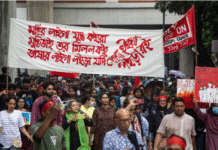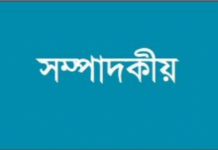What graduating out of LDC status means

It is indeed a seminal event in the history of Bangladesh that the UN last year declared Bangladesh eligible to step up to a developing economy from being a Least Developed Country (LDC). Of course the process is gradual and due to take effect in 2024 with a grace period of three years to wean off the special dispensations of the LDC status.
The graduation process has been in the works for at least a couple of decades as the country steadied its economic direction and dug in deep with its market economy orientation since the early nineties. The consistent five-percent-plus economic growth over the last three decades combined with booming apparel exports and incremental development and strengthening of economic institutions such as Bangladesh Securities and Exchange Commission, Bangladesh Investment Development Authority, Competition Commission, Directorate of National Consumer Rights Protection, and others have paved the way for Bangladesh to march ahead to the top of LDCs and steadily distance itself from other LDCs in terms of economic performance.
That Bangladesh would be classified as a middle-income country ridding itself of the stigma of being at the bottom of the economic performance band known as the Least Developed Countries (LDCs) in course of time was inevitable. In fact, when Bangladesh was first grouped under the LDC category in the mid-seventies, it actually did not meet one of the principal criteria of being a LDC: its population size was much above the threshold set for LDCs. It is claimed by the cognoscenti that Bangladesh’s inclusion was engineered by an eminent economist of the soil who happened to be working for the UN at the time.
The LDC privileges, the LDC stigmas
The LDC classification is a mixed bag. On the one hand, it accords us duty-free access to the richer economies of the world, concessional credits from the multilateral development institutions such as the World Bank, Asian Development Bank and others, exemption from intellectual property rights enforcements for the time being and other economic benefits.
Based on pure number of flooding incidents, Bangladesh would not even rank in the top 10 most flood-prone countries of the world but the scenes of flooding and destitute street beggars in Bangladesh making the rounds of BBC and CNN have created an impression that all of Bangladesh is submerged under water most of the year. I recall meeting the chief executive of a billion-dollar corporation in the US in the nineties who asked me in all seriousness whether I owned a boat as he thought that’s the only way people in Bangladesh can move around. I was so aghast that I told him I did not but then again we really learn to swim very early! It took him several long seconds to realise the pun. But at the end of the day, when your trading partners take you as a “Least Developed” hand-to-mouth survivor at the bottom of the economic pyramid, it is not a lot of fun to make deals. And deals are what make businesses thrive and businesses are what create wealth for the nation, and the more wealth the nation makes, the higher it moves up the economic performance scale.
So the bottom line is that while the LDC status gave us a concessional window into global markets and credits, it also held us back as if in a straitjacket of negative perceptions, making it extremely difficult for our businesses to move up the value chain and contribute more to the economic might of the nation.
The graduation to middle-income status
On a per-capita income basis, Bangladesh has crossed the lower band of the middle-income status as defined by the World Bank last year. Bangladesh has to maintain or exceed several other economic and social indicators over the next five years to be formally stripped of the LDC moniker. Aside from an economic and governance disaster happening in the intervening period, nothing can deter Bangladesh’s graduation to middle-income status in 2024. Several other LDC countries are also en route to similar status change by then.
Visionary proclamations in the ICT Policy 2009
The ICT policy adopted by the government in 2009 set the achievement goals based on economic development enabled by ICT and predicted graduation to middle-income country by 2021 and a developed economy by 2041. It is heartening to see the government aligning its overall development strategy in sync with the proclamations of the ICT Policy 2009 which was drafted by a working group headed by this author under the overall guidance of National Professor Jamilur Reza Choudhury in 2008.
Losing the LDC privileges: the economic fallout
The impact of the loss of LDC privileges has been softened by a three-year grace period from 2024 to 2027, during which time the country must prepare itself, if not done already, to negotiate bilateral trade protocols with our major trading partners; carry out institutional strengthening of the World Trade Organization Directorate in partnership with the major national trade associations; and enhance productivity of both manufacturing and services industries to face off global competition. The threat of intellectual property rights enforcement is another major concern that will have to be concertedly addressed by the pharmaceutical and software industries, among others, but the gradual benefits of local IPR will outweigh the impact of overseas IPR costs.
The seamy side of LDC privileges
At the receiving end of being an LDC are the prescriptive charity packages from multilateral development partners such as the International Monetary Fund, the World Bank and others. These funding agencies provide both outright grants and concessional loans that come with strings attached such as imposition of institutional reforms and development projects put together by international consultants that are detached from the ground realities and that most often turn out to be very expensive for the country.
There are numerous examples where a locally conceived development project worth a few crore taka taken over by such a development partner bloats in size to more than several hundred crores and ends up with a top-heavy project with no local inputs and gets shuttered as soon as the project ends. The nation is then left with a huge loan tab to repay over many years. Such project bloats are all too common when donor funds are involved. With LDC status removed, such concessional lending with donor-imposed unrealistic conditions should be gone and that cannot be fast enough.
What a ‘developing economy’ status means for businesses
Graduating from an LDC into a developing economy will see more higher-end exports as we move up the value chain. ICT services exports will get a huge boost as will professional services export. Developing economy also means that government employees will be better compensated and government services will become more professional and business-friendly. The big change will be perceptible lessening in corrupt practices whereby the informal economy will go down as a share of GDP, thus strengthening the economy further.
LDC graduation is the beginning of a great march to economic emancipation of the nation as a whole. Let’s all partake in it in realising a truly Shonar Bangla with no one left behind.
Habibullah N Karim is an author, policy activist, investor and serial entrepreneur. He is a founder and former president of BASIS and founder/CEO of Technohaven Company Ltd.
Email:hnkarim@gmail.com









